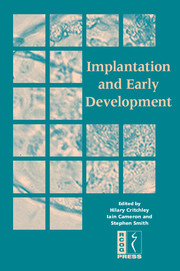Book contents
- Frontmatter
- Contents
- DECLARATION OF INTEREST
- Participants
- Preface
- SECTION 1 PREPARATION FOR IMPLANTATION – THE UTERINE ENVIRONMENT
- SECTION 2 THE EMBRYO
- 9 What makes a good egg?
- 10 What makes ‘good sperm’?
- 11 Morphogenesis of the early mammalian embryo: cell lineage heterogeneity and developmental potential
- 12 Epigenetics in development and cloning by nuclear transfer: alternative approaches to nuclear reprogramming
- 13 Risks associated with assisted reproduction: insights from animal studies
- 14 Pre-implantation genetic testing
- SECTION 3 LESSONS FROM ANIMAL MODELS (TRANSGENICS) AND NOVEL TECHNOLOGIES
- SECTION 4 CLINICAL SEQUELAE
- SECTION 5 CONSENSUS VIEWS
- Index
12 - Epigenetics in development and cloning by nuclear transfer: alternative approaches to nuclear reprogramming
from SECTION 2 - THE EMBRYO
Published online by Cambridge University Press: 05 June 2014
- Frontmatter
- Contents
- DECLARATION OF INTEREST
- Participants
- Preface
- SECTION 1 PREPARATION FOR IMPLANTATION – THE UTERINE ENVIRONMENT
- SECTION 2 THE EMBRYO
- 9 What makes a good egg?
- 10 What makes ‘good sperm’?
- 11 Morphogenesis of the early mammalian embryo: cell lineage heterogeneity and developmental potential
- 12 Epigenetics in development and cloning by nuclear transfer: alternative approaches to nuclear reprogramming
- 13 Risks associated with assisted reproduction: insights from animal studies
- 14 Pre-implantation genetic testing
- SECTION 3 LESSONS FROM ANIMAL MODELS (TRANSGENICS) AND NOVEL TECHNOLOGIES
- SECTION 4 CLINICAL SEQUELAE
- SECTION 5 CONSENSUS VIEWS
- Index
Summary
Summary
The mechanisms by which a cell attains and maintains a differentiated phenotype is fundamental to the process of animal development. During development and differentiation, cells undergo spatial and temporal patterns of gene expression. The mechanisms controlling such events do not, in the majority of cases, involve alterations in DNA sequence; rather, modifications to DNA and chromatin structure have been implicated. Such modifications, which include methylation of the DNA and post-translational modification of core histones, have been termed ‘epigenetic’ and are heritable through mitotic division. Epigenetic ‘reprogramming’ occurs at all stages of development but is becoming well characterised during germ cell and early embryo development. The technique of somatic cell nuclear transfer (SCNT) has demonstrated that oocyte cytoplasmic components are able to interact with somatic nuclear genetic material and result in the production of viable offspring. The mechanisms involved in these de-differentiation or re-differentiation events are unknown but have been broadly termed ‘nuclear reprogramming’ and are thought to involve ‘epigenetic reprogramming’ of the genome. The fact that SCNT techniques have proved that the egg cytoplasm is able to ‘reprogramme’ the genetic material from differentiated nuclei raises the possibility that the differentiated phenotype of a cell may be manipulated by other means in order to de-differentiate or trans-differentiate cell function. This paper will briefly review ‘epigenetic reprogramming’ during early development, describe the background to the technique of NT, and discuss the present knowledge on ‘reprogramming’ in cloned embryos.
Keywords
- Type
- Chapter
- Information
- Implantation and Early Development , pp. 141 - 154Publisher: Cambridge University PressPrint publication year: 2005



